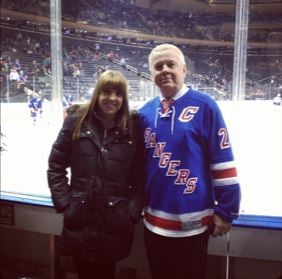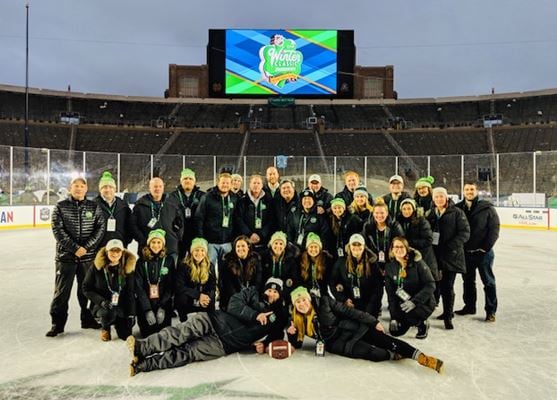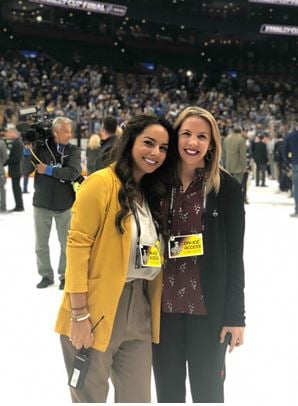INTRODUCTION
From All-Star weekend to the Stanley Cup, credentialing for the National Hockey League (NHL) is no small feat. As the credentials and events manager for the NHL, Brittany Smyth is the person who makes sure everyone on-site has what they need for game day, but not necessarily what they want.
“People feel like they need all access and that’s not true,” she says.
Between her love for hockey—she grew up in a family of season ticket holders for the New York Rangers—and her experience organizing and managing events, it was only natural that she would end up at the NHL credentialing thousands of people.
We sat down with her to talk about what it takes to credential that many people for a major event, and to make sure everyone who needs access to the site has the right amount of it.
Thanks for doing this Brittany.
My Pleasure.
Where did you grow up?
I grew up in East Islip, New York, which is in Long Island.

Were you a sports fan growing up?
Yes, I was raised on hockey. My dad has been a season ticket holder for the New York Rangers for 25 years. I have been going to hockey games since I was five.
I love it. He must've been really happy when you got this role.
Absolutely, yes. He was ecstatic.
Given your role in the NHL, can you have a favorite team now?
We're always told to stay neutral but in the office each person does portray who their favorite team is and where their loyalty lies. I definitely have my Rangers set up at my desk.
How many times a week do you get asked for tickets?
When people see your title or know where you work, they automatically reach out for tickets or discounts. Let’s just say it can be hard to maneuver.
When did you know you wanted to start working in sports or events and when did you really start that process?
I've always been a huge sports and hockey fan and I've been going to the games since I was five, so I knew pretty early that I wanted to be in the sports and events world. Then, in college I was in a sorority and I planned a lot of our events. I gained a lot of knowledge about everything that goes into them.
Fast forward to today's role, can you walk us through your role and what events you work on with the NHL?
I handle the credentialing process for all of our events. Those events are the Heritage Classic, Winter Classic Stadium Series, and our arena events which are the All-Star Game, the Stanley Cup Final, the draft, and the NHL awards. We just started dabbling in international events. I also handle the entire credentialing process for those..jpg?width=1024&name=cut%20(1).jpg)
Photo Cred: NHL
How many credentials are you typically managing for a major event like the Stanley Cup?
That's a good question. It's the best out of the seven games and last year we went to seven games. It’s hard to give an exact amount, but it was probably about 20,000 credentials.
What's your favorite part of the process?
Definitely the ending. The end result of the entire event is the ultimate aha. Everything went flawlessly, everyone is wearing their credentials, and everything is running smoothly. That’s such a great feeling.
When do you really start working on an event?
The planning process is ongoing. As soon as we finish one event, we're thinking about that same event for next year. I would say up to six months we're planning.
The credential process tends to start three months before the event. That’s when we start to hone in on who’s coming and who really needs a credential.
And who are the different types of groups you are credentialing?
NHL staff, media, event staff (vendors), rights holders, sub rights holders, venue personnel, teams (includes players, coaching staff, hockey ops staff), NHL Players’ Association, photographers, and guests.
What does the process look like?
That process can be different for different groups. With media they apply as affiliate managers. Each manager applies for their outlet and they collect and submit information on behalf of all their employees and staff.
Vendors, on the other hand, work directly with me. They fill out a credential request form for all staff that require a credential. This credential form includes names, affiliation, and job title. I go through all the lists and manually decide who gets a credential and zone appropriately.
We also have a lead on our team responsible for approvals. The lead on the event approves it first and then we sit down and zone appropriately depending on the job function.

How do you encourage effective coordination between you and other departments?
Our internal staff tends to be the group that's the most difficult to credential because everyone believes that they're supposed to get all access. That's definitely not the case. That's where separating the wants and the needs comes into place. Communication is definitely made from the higher ups that you will be credentialed appropriately for your job function for that event and if you don't have a job function then you're not getting a credential.
When it comes to credential types and zones, do you have a standard set up for each event?
Outdoor games and anything played in an arena is consistent and doesn't change. We have about 10 credential types. Zoning is different for an outdoor game versus an All Star Weekend or a Stanley Cup Final.
Do you have any advice for when it comes to setting up zones and types?
When it comes to zoning you have to separate what people really need and what people want. People feel like they need all access and that's not true.
What are the primary departments you coordinate with to make sure the zones are established appropriately?
The communications and event operations teams are the two primary departments we coordinate with.
The communications team handles the media credentialing. Media gets one particular zone. They don't get anything besides media areas.
I work with my event operations team a lot. Since our event operations team hires the vendors, we go over where the vendors need to be and we determine the necessary zone from there.
Do you have different credentials for load-in and game days and how do you manage that?
We use a wristband system for load in. We don't credential anybody that is just strictly there for load-in in because then they could use that credential for game day. If you have the credential, you can just walk around and we don’t want just anyone doing that. Credentials are used strictly for when you're working the game itself.
With wristbands, we have multiple colors that represent different days, so there can be five wristbands for different load-in groups. Something we think about a lot, is making sure everything is organized and security can see all wristbands and credentials. We try and set up the credentials and wristbands to reduce as much confusion at each access point as possible.
I will say that we're trying to get away from wristbands completely. Anybody can get an orange wristband or a yellow wristband and that can create a danger zone.
 Do you see a lot of fraud with your credentials?
Do you see a lot of fraud with your credentials?
We tend to see fraud at the Stanley Cup Final. After game one someone can see what our template looks like and create it and try to get into the other games. We’re trying to incorporate scanning into the next Stanley Cup.
What is the training process for the security team?
The event operations group handles the training for the security team. I hold a meeting the day before practice day and review the credential board. We go through the wristband colors and try to explain it to them as best as we can. It can be difficult because the credential boards are confusing and have a lot of information on them.
I'm sure you're constantly thinking about how to innovate this process or make it more efficient. Do you talk to other teams or leagues to get information on best practices?
Last year the NBA held a credential conference. That was super helpful because the NBA, MLB, and NFL met and talked about what we do. There was so much advice and it was great to hear how each league handles credentials because believe it or not we all handle it very differently.
What manual processes would you like to see technology replace or automate?
I would definitely like to see everything collected into one system. Right now we're having some of the information collected in one system and then the other portion is coming directly to me.
How do you think technology will advance to support this process?
I would love to do facial recognition. Facial recognition would streamline the process completely at each access point. I hope we can do something like that in a few years.
Getting back to the events, how does your role change on event days?
Practice days and game days are heavy credential days. After my credentialing duties are fulfilled, I help with post-game responsibilities. I help monitor the ice with the event operations teams and make sure everyone has the appropriate badges before stepping on the ice.
Are you doing any type of recap after game day and load out?
We recap how many credentials we printed for each group. This helps me figure out how many credentials to order for the following event. It also helps me stay consistent and make sure the price stays low. I tend to order too many. It’s better to have too many because you never know how many last minute requests you’re going to get and we tend to get a lot.
If you could be the credential manager for any event in the world (besides an NHL event), what would it be and why?
The Super Bowl or the Olympics. They’re both huge events and I would love to see the entire process from start to finish.
Last one: how do you see your role changing in the next 10 years?
I think facial recognition is going to be the future of credentials. I definitely believe people should still wear a physical credential, but the facial recognition is a twofold part.
LENND, INC
Lennd is a next generation event management platform that simplifies operations and logistics so event teams can work smarter, move faster, and improve their ROI.
To learn why some of the most respected event teams trust Lennd to power their operations or sign up for a demo: www.lennd.com



